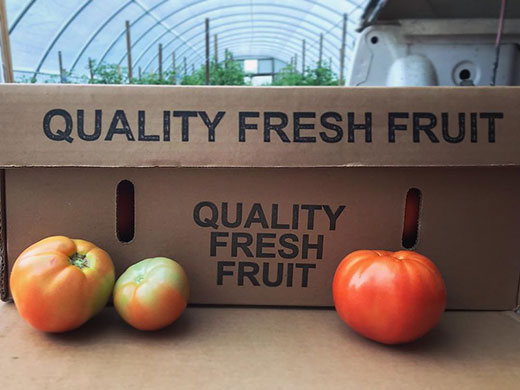
Kansas State University's Olathe Horticulture Research and Extension Center collaborated with After the Harvest to donate more than 11,000 pounds of fresh produce to Kansas and Missouri food banks. | Download this photo.
K-State vegetable research leads to food bank donation
University partnered with local organizations to provide more than 11,000 pounds to hungry families
February 7, 2020
OLATHE, Kan. – The work that Kansas State University researchers do to determine the best and safest ways to grow tasty, nutritious fresh vegetables has yielded a bountiful benefit for hungry Kansas and Missouri families.
Fresh produce research at K-State’s Olathe Horticulture Research and Extension Center during the 2019 growing season resulted in a donation of 11,241 pounds of fresh produce to After the Harvest, a non-profit gleaner in Kansas City, Missouri. ATH is the largest produce donor to Harvesters – The Community Food Network. Harvesters is a regional food bank serving 26 counties in northeast Kansas and northwest Missouri from facilities in Topeka, Kansas and Kansas City, Missouri. Harvesters provides food to more than 760 nonprofit agencies including emergency food pantries, community kitchens, homeless shelters, children’s homes and others.
“Our partnership with ATH creates a win-win situation. Our graduate students get the vegetables they need to conduct important research and our center helps fulfill K-State Research and Extension’s Grand Challenges by reducing food waste and donating fresh, nutritious produce to help families stretch their food dollars,” said Cary Rivard, Olathe Horticulture Research and Extension Center director. Since 2016, the center has donated more than 40,000 pounds of fresh vegetables to ATH.
Donated vegetables – tomatoes, cucumbers, peppers, lettuce, and spinach in 2019 – were grown for research projects of graduate students in the Urban Food Systems program at K-State Olathe and for variety trials. The amount of vegetables required for research was sorted and taken to K-State Olathe’s laboratory for analysis. All remaining vegetables were made available to After the Harvest. Each week during the growing season, ATH volunteers gathered vegetables not used for research.
Additional produce grown at the K-State Olathe Horticulture Center by a Johnson County Extension Master Gardeners group in its Backyard Garden Demonstration Plot was donated directly to the Olathe Salvation Army Food Pantry. The Extension Master Gardener program is a volunteer program in which K-State Research and Extension "trades" classroom training for volunteer time, all of which is coordinated by a local (county or district) extension agent.

